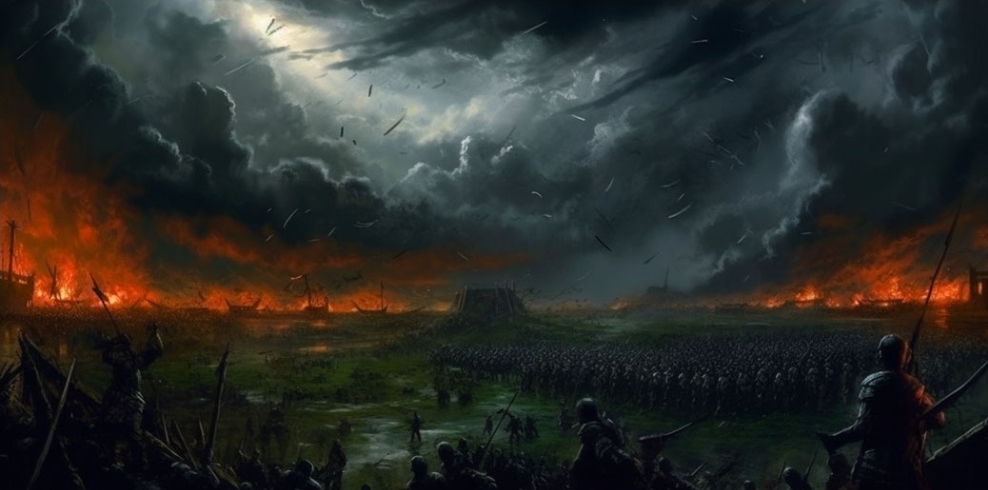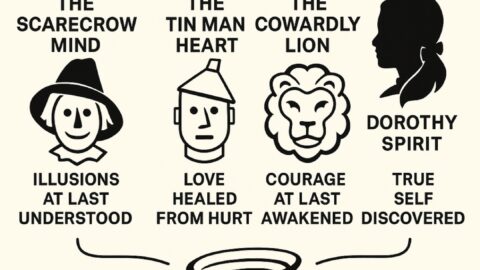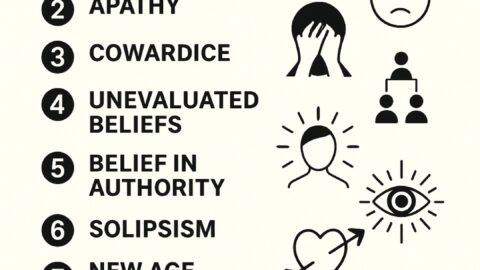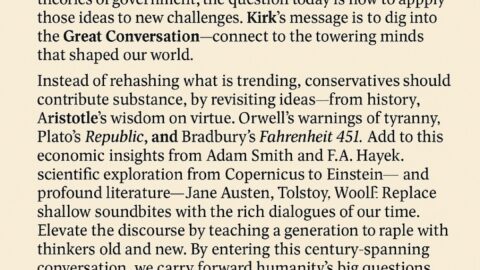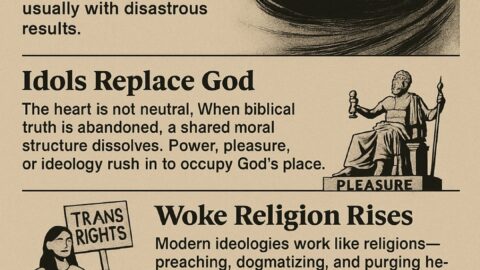“An age is called Dark not because the light fails to shine, but because people refuse to see it.” — James A. Michener
This quote speaks to the idea that darkness in an era is not defined by an actual absence of truth, wisdom, or knowledge, but rather by a collective refusal to acknowledge, embrace, or act upon these truths. Today, many argue that we are indeed in a modern “Dark Age,” not because knowledge or truth is unavailable, but because societal forces and individual choices often obscure or reject them.
Are We in a Modern Dark Age?
a. Refusal to See the Light
- Despite unprecedented access to knowledge and information through the internet, people often choose echo chambers that reinforce their pre-existing biases.
- Cognitive dissonance makes individuals reject truths that challenge their worldview or comfort zones.
b. Ignorance
- While knowledge is widely available, critical thinking is declining.
- People are overloaded with information but lack discernment to filter truth from falsehood.
- Many are content with surface-level understanding and rarely dive deeper into meaningful exploration.
c. Indoctrination
- Education systems, media, and social platforms often push one-sided narratives rather than fostering open inquiry.
- Critical thinking and independent analysis are often replaced by rote learning and ideological conformity.
- Indoctrination can happen subtly through entertainment, cultural trends, and social expectations.
d. Propaganda
- The rise of algorithm-driven content consumption ensures people only see what aligns with their biases.
- Governments, corporations, and influential figures exploit social media and news outlets to manipulate public opinion.
- Truth is often diluted, distorted, or replaced with sensationalism to drive emotional reactions rather than rational thought.
e. Hedonism
- The modern age prioritizes instant gratification and pleasure-seeking.
- Many seek distraction through consumerism, social media, entertainment, and material wealth rather than pursuing deeper spiritual, intellectual, or emotional growth.
- Emotional numbness, stemming from endless consumption, leads to a loss of purpose and clarity.
How Does This Compare to Historical Dark Ages?
- In the historical Dark Ages, knowledge and literacy were restricted to the elite.
- Today, we have endless access to knowledge, yet ignorance persists, not because of scarcity, but because of willful avoidance or distraction.
- Both eras suffer from a loss of higher purpose, spiritual decline, and an obsession with material survival or pleasure.
Why Do People Refuse to See the Light?
- Comfort Zone: Truth often demands action, sacrifice, or change, which many find uncomfortable.
- Fear: The unknown or challenging beliefs can feel threatening.
- Groupthink: Social belonging often outweighs personal integrity.
- Distraction: Endless entertainment and consumption keep people from reflecting on deeper truths.
- Cynicism: Many people feel powerless to create change and thus stop seeking truth.
How Can We Escape This Modern Dark Age?
a. Cultivate Critical Thinking
- Ask questions. Challenge assumptions. Seek multiple perspectives.
b. Prioritize Discernment
- Learn to separate truth from noise, facts from opinions, and wisdom from propaganda.
c. Build Emotional and Spiritual Maturity
- Develop resilience, patience, and self-awareness.
- Pursue spiritual growth and a higher purpose beyond materialism.
d. Limit Hedonistic Pursuits
- Practice moderation and self-discipline.
- Shift focus from instant gratification to long-term fulfillment.
e. Take Personal Responsibility
- Don’t rely solely on institutions or external authorities for truth.
- Be proactive in seeking knowledge, wisdom, and clarity.
While the tools for enlightenment—wisdom, knowledge, faith, and truth—are still shining brightly, many refuse to look directly at them. Whether through ignorance, indoctrination, propaganda, or hedonism, society risks repeating the patterns of past Dark Ages. However, individuals can choose to see the light, embrace truth, and become beacons of clarity and hope in their communities.
The “light” never stops shining; it’s up to each person to open their eyes, face the truth, and act with courage and integrity.
During the Dark Ages (roughly 5th to 15th centuries, though historians debate its exact timeline and relevance), society faced significant challenges, including political instability, economic decline, cultural stagnation, and limited access to education. However, not everyone was passive or defeated by these hardships. Many individuals and groups played critical roles in preserving knowledge, fostering spiritual and intellectual growth, and laying the foundation for future societal advancements.
The Role of Faith and Religion
- Monasteries as Centers of Learning:
- Monks and nuns, particularly in Benedictine monasteries, preserved and copied ancient texts, including the Bible, classical literature, and scientific manuscripts from ancient Greece and Rome.
- These religious communities became sanctuaries of knowledge during a time when literacy was rare.
- Spiritual Resilience:
- Faith provided people with hope, meaning, and moral guidance amid chaos and suffering.
- Christianity and other faith traditions emphasized virtues like charity, humility, and perseverance.
- St. Thomas Aquinas and Scholasticism:
- Thinkers like St. Augustine and St. Thomas Aquinas combined faith with reason, laying philosophical and theological foundations that still influence society today.
Intellectual Preservation and Innovation
- Scholars and Thinkers:
- While much of Europe faced intellectual stagnation, the Islamic Golden Age (8th–13th centuries) flourished in the Middle East, preserving and expanding upon Greek, Roman, and Persian knowledge.
- Scholars like Avicenna (Ibn Sina) and Alhazen (Ibn al-Haytham) made significant contributions to medicine, astronomy, and mathematics.
- Education Centers:
- Institutions like the University of Paris, Oxford, and Cambridge began to emerge in the later Middle Ages.
- These centers became hubs for learning and debate.
Community and Mutual Support
- Local Communities and Guilds:
- Communities leaned heavily on each other for support, survival, and trade.
- Guilds (trade associations) provided education in craftsmanship and supported members in times of need.
- Family and Kinship Bonds:
- The family unit served as a cornerstone of survival, passing down knowledge, traditions, and skills.
Art, Architecture, and Cultural Expression
- Cathedrals and Churches:
- Gothic cathedrals, like Notre Dame and Chartres Cathedral, symbolized humanity’s aspiration towards God and showcased architectural ingenuity.
- Stained glass windows often served as educational tools for the illiterate, depicting biblical stories.
- Art and Literature:
- Writers like Dante Alighieri (The Divine Comedy) and Geoffrey Chaucer (The Canterbury Tales) used literature to critique society, inspire reflection, and preserve cultural narratives.
- Art became a means of expressing spiritual devotion and telling stories to the masses.
Resilience in Daily Life
- Agriculture and Survival Skills:
- The majority of people were peasants or farmers who worked the land to sustain themselves and their lords.
- Innovations like the three-field system improved agricultural efficiency.
- Adaptability:
- Communities adapted to challenges such as plagues, famines, and wars with resilience and resourcefulness.
- Trade and Exploration:
- The Venetians and other trade powers kept commerce alive, connecting Europe to the Middle East and Asia through trade routes like the Silk Road.
Resistance and Reformation
- Spiritual and Social Reformers:
- Figures like St. Francis of Assisi emphasized humility, compassion, and simplicity in service to others.
- Reform movements, such as the Cluniac Reforms, sought to address corruption within the church.
- Dissent Against Injustice:
- Rebels and reformers occasionally rose against oppressive systems, demanding fair treatment and justice.
- These actions laid the groundwork for later movements like the Renaissance and Reformation.
What Can We Learn from Them Today?
- Value Knowledge: Prioritize education, critical thinking, and discernment over passive consumption of information.
- Preserve Wisdom: Like monks who copied manuscripts, we must preserve and pass on timeless wisdom and truth to future generations.
- Strengthen Faith and Morality: A strong spiritual foundation helps people endure suffering and remain resilient.
- Build Community: Foster genuine relationships, mutual support, and collective action within families and local groups.
- Be Creators, Not Just Consumers: Whether through art, writing, or innovation, contribute something meaningful to society.
- Adapt and Persevere: Challenges will come, but resilience and adaptability are key to overcoming them.
In conclusion, the people of the Dark Ages survived and preserved civilization by relying on faith, community, knowledge, and resilience. While history might paint those centuries as stagnant, they were also periods of quiet perseverance, foundational work, and cultural preservation that paved the way for future ages of enlightenment and progress. In our modern “Dark Age,” we would do well to learn from their example and apply these lessons to our current challenges.

